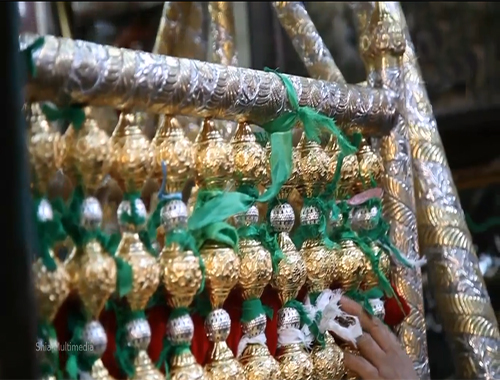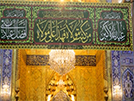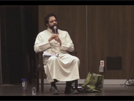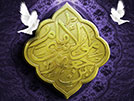Chapter 1-Cordial disciplines
- Details
- Hits: 9399
Cordial disciplines
--------------------------------------------------------------------------------
One of the cordial disciplines of the worships and the spiritual duties of the traveler along the path to the Hereafter is paying attention to the Might of the Lord and to the humility of servitude. It is one of the important stages for the salik (traveler). The strength of everybody's suluk (journey) is in proportion to the strength of this attention, or rather the perfection or the imperfection of humanity is connected to the perfection or imperfection of this matter. The more one is overwhelmed by egoism, egotism, self-conceit and selfishness, the farther he will be from the human perfection and from the nearness of the presence of Allah. The veil of self-conceit and egotism is thicker and darker than all other veils. To tear open this veil is more difficult than tearing all other veils, and tearing it is a preparatory step to tearing other veils. In fact, tearing off this veil is the master key for the invisible, the visible and the great door of the ascent to the perfect spirituality. As long as man has his eyes on his own self, his imagined beauty and perfection, he will be veiled and discarded from the absolute beauty and pure perfection. The first condition for travelling to Allah is to leave this house. Actually, it is the criterion for the struggle between right and wrong. So, every salik, who travels with the steps of selfishness and self-conceit, and is wrapped in the veils of egotism, his sufferings would be in vain and his journey would not be to Allah, it would rather be to his self: "The mother of the idols is the idol of your self'. [18]
Allah, the Most High, says: "And whoever Leaves his house migrating to Allah and His Messenger, and then death overtakes him, his reward is, indeed, with Allah," [19] The formal migration, or the form of migration, is the corporeal migration from the formal house to the ka'bah or to the shrines of the holy men [awliya'] (AS), but the spiritual migration is the going out of the house of the soul and the house of this world to Allah and His Messenger. To migrate to the Messenger and the guardian [waliy] is also a migration to Allah. As long as one's soul has an inclination to oneself and to egotism, it is not journeying. And so long as there are residues of I-ness in the salik's eyes, and as long as the walls of his own town and the adhan announcing selfishness have not yet disappeared, he is regarded present, not a traveler or an emigrant.
It is stated in Misbahush-shari'ah that Imam as Sadiq (AS) said: "Servitude is a gem whose core is Lordship [rububiyat]. Whatever is lost of servitude is found in the Lordship, and whatever is hidden of Lordship is obtained by servitude." [20]
The one who travels on the foot of servitude, and burns his forehead with the brand of the humility of serfdom, will reach the Glory of (His) Lordship. The way of attaining to the facts of Lordship is journeying along the footsteps of servitude, and what is lost of servitude because of egoism and egotism, can be recovered under the shadow of the Lordship's patronage, until he reaches a stage in which the Haqq (Allah), the Most High, will become his ears (hearing), eyes (seeing), hands and legs, as is stated in the true and well-known hadith accepted by the two sects. [21]
When the salik forsook his conducts [tasarrufat] and completely submitted the kingdom of his existence to Allah, leaving the house to its Owner, and perishing in the Glory of (His) Lordship, the Owner of the house would Himself manage the affairs. Thus his conducts [tasarrufat] would become divine, and his eyes would be divine and he would see with the Haqq's (Allah's) eyes, his ears would become divine and he would hear with the Haqq's (Allah's) ears. The more complete the lordship of the soul and the more its glory be cherished, the more, in the same proportion, the Glory of the (divine) Lordship decreases and becomes incomplete (in the salik's kingdom of existence), because these two stand face to face: "This world and the next are like the two wives of a man". [22]
Thus, the salik to Allah has to recognize his state of humility, and to place the humility of servitude and the Glory of the Lordship before his eyes. The stronger this viewpoint, the more spiritual his worship and the stronger the spirit of his worship, until, if, with the help of Allah and the perfect holy men [awliya'] (AS), he reaches the truth of servitude and its core, he will catch a glimpse of the secret of worship. In all the worships -especially (in) the salat which has a position of comprehensiveness [jami'iyat], and is, among the worships, like the Perfect Man, and like the Greatest Name (of Allah), or rather it is the very Greatest Name these two positions, i.e. the position of the Glory of Lordship, which is a fact, and the position of the humility of servitude, which accompanies it, are occult. Among the recommended acts the qunut, and among the obligatory acts the sujud, have particular specialities to which we shall refer later insha 'allah.
It should be noted, however, that absolute servitude is of the highest degrees of perfection and of the loftiest positions of humanity, of which no one has any share except the most perfect of the creatures of Allah, Muhammad (SA) at the top, followed by the perfect walis (the Guardians). The others are limping in servitude, and their worshipping and servitude are endued with causes, only with the steps of servitude one can reach the real absolute mi'raj. That is why the noble ayah says: "Glorified is He Who carried his servant by night ...". [23] It was the step of servitude and the attraction of (His) Lordship that carried that holy person to the mi'raj of proximity [qurb] and union [wusul]. In the tashahhud of the salat - which is a return from an absolute "annihilation" [fana'] that was achieved in the sujud there is once again a tendency to servitude, before paying attention to the Messengership. It may also be a reference to the position of Messengership as a result of the essence of servitude. This is a lengthy subject which is out of the scope of these papers.
Notes:
[18]. The Mother of the idols is your self's idol, As those are snakes, and this is a dragon-idol! (by Maulawi)
[19]. Surah an-Nisa: 100.
[20]. Misbahush-Shari'ah, "On the Reality of Servitude", ch. 100.
[21]. This is a reference to a narrative about "The Approximation by Nawafil", which reads: " ...He (Allah's servant) keeps trying to get closer to Me by means of the nafilah until I love him. Loving him, I will become his ears with which he hears, his eyes with which he sees, his tongue with which he speaks and his hand with which he strikes. When he asks Me I answer him, and if he demands from Me 1 will give him ..." 'Usul ul Kafi, vol. 4, p. 53, the book of "Faith and Infidelity", ch. on "One who hurts and despises the Muslims", narratives 7 and 8.
[22]. 'Awaliyul-La'ali, vol. 1, p. 277, and vol. 4, p. 115. Nahjul Balaghah, edited by Faydul Islam, maxim, No.100.
[23]. Surah al-Isra': 1.











